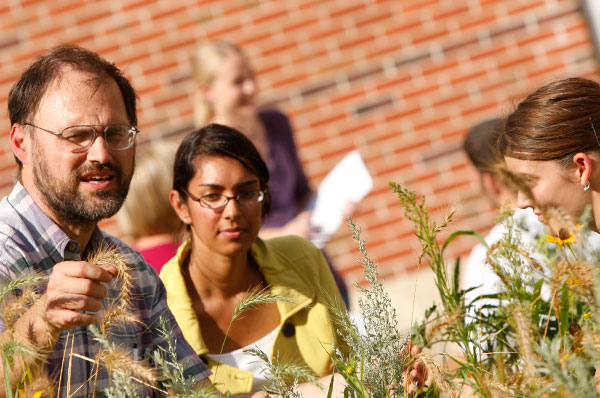Land steward, development of WSU Arboretum create center for sustainability and education
Over the last 20 years, Winona State University has undergone a transformation from a utilitarian campus dominated by concrete and gravel to a garden oasis in the center of the city. The transformation continues today as the university outlines its vision for the future.
Bruno Borsari, associate professor of biology, has been serving since last summer as Winona State’s first-ever land steward, assisting the WSU community to engage in a variety of educational activities.
“This is a tremendous opportunity to steer education toward sustainability while making steps toward a more eco-driven curriculum at WSU,” Borsari said. “The open space land resources we have can truly contribute to make education transformative.”
The university has also formed the Arboretum and Land Stewardship Committee to provide vision, oversight, and advice regarding the development of the WSU campus as a designated regional Landscape Arboretum. Winona State’s grounds, from main campus to East Lake to Krueger Woods in the bluffs of Garvin Heights, will serve as a showcase for the region’s native plants and a public classroom/lab for everyone, from visiting K-12 school groups to senior citizens.
“The WSU arboretum would support public enjoyment, education, and scientific research,” said WSU professor emeritus and committee co-chair Jim Reynolds. “We want the campus to be more than just a nice place to look at. We want it to provide inspiration for students and for the community.”
Educational outreach efforts include an online WSU Arboretum database. “Many trees on campus have been labeled with a QR code that links to information on growing conditions, habitat, and history,” said Reynolds. “Eventually every flower, shrub, and grass on campus will be labeled similarly, with the goal of turning the campus into a living laboratory.
One challenge the committee will confront is financial support for the arboretum. Protecting the campus for future generations is a priority, said Reynolds, “but we need resources beyond what the university can provide.”
As the Arboretum and Land Stewardship Committee develops its plans, it will seek resources to support its work on sustainability, conservation, and education. To support the WSU Arboretum Fund, contact University Advancement at 507.457.5020.


